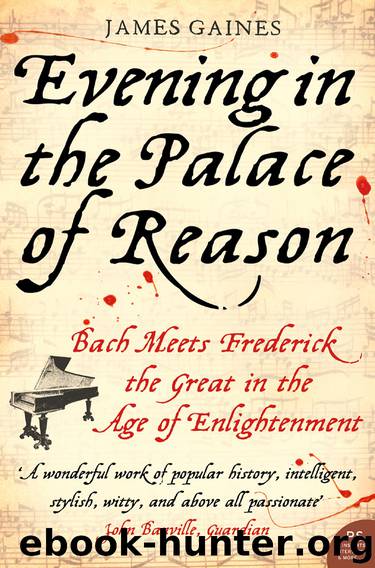Evening in the Palace of Reason by James Gaines

Author:James Gaines [James Gaines]
Language: eng
Format: epub
ISBN: 9780007369461
Publisher: HarperCollins Publishers
Published: 2005-10-10T16:00:00+00:00
His application was decidedly ill-timed, coming before the official mourning period for Augustus was over and as Friedrich’s claim to the Polish throne was under attack, but Bach pursued it with almost undignified but oddly uncompromised zeal.
For the birthday of the new elector’s young son that fall, he wrote one of his secular drammi per musica, this one called Hercules at the Crossroads (BWV 213), which used a classical myth to celebrate the boy’s prestige and also gave Bach the opportunity for a sermon, an attempt to put this young man on the right path (not a bad idea, considering his grandfather). The story was well known despite somewhat esoteric origins. In Xenophon’s Memorabilia, it is told by Socrates, who attributes it to his teacher. As the story goes, Hercules was just coming into his young manhood when two women came to him in a vision, one representing virtue, the other vice. Vice promises him “a short and easy road to happiness. You shall taste of all life’s sweet and escape all bitters … your only speculation what meat or drink you shall find agreeable to your palate, what delight of ear or eye, what pleasure of smell or touch.” Virtue admits that hers is the more difficult path but warns him of the easy road to ruin and promises that if he chooses her, “you shall be moved to accomplish many a [great] and noble deed.”
Bach, of course, enjoined the new elector’s crown prince to answer as Hercules does, and just to make sure his dedicatee got the message, Hercules’ love duet with Virtue is followed by a recitative from Mercury singing:
Behold, you gods, here is a portrait
Of the youth of Saxony’s Crown Prince….
Three months after Hercules he wrote and staged another dramma per musica for the new elector’s wife. In the fall of the following year, on very short notice—Friedrich decided suddenly to visit the Michaelmas Fair in Leipzig—he cobbled together still another one. We can infer the full measure of his desire to please from the fact that he pulled its nine movements together in only three days and that its lyrics approach Lullian heights of sycophancy over Friedrich’s contest for the Polish throne. At that it was entirely in keeping with the rest of the festivities, for which the town and all its towers were illuminated by hundreds of torches, visible for miles around. Six hundred students carried candles in procession (past little verse messages posted in the windows of hopeful shopkeepers along the way, clearly meant for a merciful and philanthropic elector: “Debts oft bring me incarceration / But tonight I have illumination” and “I love my King with heart devout / I have a lot of pain from gout”). Four lucky counts presented the score of Bach’s work to the elector and got to kiss his hand, after which came the music. According to the town chronicler, the visiting royalty “did not leave the windows until the music was over and listened most graciously and liked it well.
Download
This site does not store any files on its server. We only index and link to content provided by other sites. Please contact the content providers to delete copyright contents if any and email us, we'll remove relevant links or contents immediately.
The Goal (Off-Campus #4) by Elle Kennedy(13678)
Kathy Andrews Collection by Kathy Andrews(11839)
Diary of a Player by Brad Paisley(7584)
Assassin’s Fate by Robin Hobb(6225)
What Does This Button Do? by Bruce Dickinson(6208)
Big Little Lies by Liane Moriarty(5806)
Altered Sensations by David Pantalony(5106)
Pale Blue Dot by Carl Sagan(5012)
Sticky Fingers by Joe Hagan(4204)
The Death of the Heart by Elizabeth Bowen(3625)
The Heroin Diaries by Nikki Sixx(3552)
Confessions of a Video Vixen by Karrine Steffans(3311)
Beneath These Shadows by Meghan March(3309)
How Music Works by David Byrne(3272)
The Help by Kathryn Stockett(3150)
Jam by Jam (epub)(3095)
Harry Potter 4 - Harry Potter and The Goblet of Fire by J.K.Rowling(3076)
Computational Linguistics and Intelligent Text Processing: 20th International Conference, CICLing 2019 La Rochelle, France, April 7â13, 2019 Revised Selected Papers, Part I by Alexander Gelbukh(2996)
Strange Fascination: David Bowie: The Definitive Story by David Buckley(2872)
